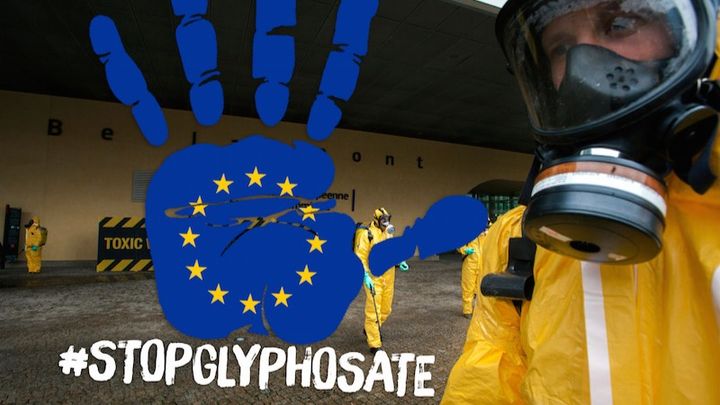In this newsletter: Stop Glyphosate coalition is active to prevent a new reapproval of the herbicide in Europe, the EU Commissions formally responds to Save Bees and Farmers citizens' initiative, ecocide makes its way into the law, etc.
Help to Stop Glyphosate – inform as many people as possible
Glyphosate, the most widely used herbicide in the world, is harmful to the environment, probably carcinogenic and likely neurotoxic to humans. It harms soil health, pollutes water and damages biodiversity. Some recent studies have linked glyphosate to the development of Parkinson’s disease.
Wherever you live, glyphosate is having an impact on your life even if you are not aware of it. It’s in your food, your body, and the dust in your house. The EU is preparing to re-approve it. In 2017 over a million Europeans officially asked for a ban. But instead, the authorities allowed another 5 years of destruction. Now Bayer and other chemical companies want to continue contributing to biodiversity and ecosystem collapse with a re-approval.
To stop this we have to highlight the facts about the dangers of glyphosate. We have to stop glyphosate to reach the Save Bees and Farmers 80% pesticide reduction goal by 2030. You can help by supporting the Stop Glyphosate coalition work with a donation on this crowdfunding page. Large or small, every contribution is helpful.

Into the weeds documentary – EU launch
On April 12 in Brussels, Belgium, a special screening of the impressive documentary Into the Weeds took place. This event included a live Q&A with glyphosate victim Dewayne "Lee" Johnson, film director Jennifer Baichwal, and experts and policymakers. The film will also be shown in the EU Parliament. Visit the film's website to watch the trailer and find out about screenings, including in the US.

European Commission answers to Save Bees and Farmers
The European Commission has officially answered to the 1 Million strong European Citizens' Initiative (ECI) Save Bees and Farmers. They welcome the citizens' involvement, and share our concerns about biodiversity, health and the future of farming. They will not introduce new legal proposals, but instead ask support for the proposed pesticide reduction and nature restoration laws. They urge the EU Parliament and the Council to find swift and ambitious agreements on the legislative proposals to reduce pesticides and restore biodiversity.
The organisers of the ECI stress the urgency and importance of pesticide reduction. It will protect people's health and stimulate biodiversity and sustainable food production. The widespread and negative effects of synthetic pesticides become clearer with every study published. Together with the organisers, we urge for more ambition by EU Parliament and Member States. Read the EU Commission's formal reply here.
Stay tuned – your voice needs to be heard!
We ask for active involvement of all concerned citizens and scientists in the process till the goals are achieved. There are upcoming discussions in the EU parliament and in all national parliaments to take position in the pesticide reduction discussion. We still see that a group of politicians is serving the interests of the industry and not that of the citizens. Your voice is very important in every stage. We will inform you when your help is needed and supply you with an easy tool to send a message to the relevant politicians.
Save Bees and Farmers is far from over! Read the ECI Press Release here.
The EU Parliament wants to make Ecocide a crime in European Law
In March, the Legal Affairs Committee of the EU Parliament unanimously voted to include ecocide to the revised EU environmental crime directive. Shortly after, the Parliament expressed its support for such measure. For the first time, a definition of ecocide appears in a European legislative text: it is very close to the consensus international definition of ecocide (June 2021) proposed by the Independent Expert Panel convened by the Stop Ecocide Foundation, mentioning, “severe and either widespread or long-term or irreversible” damage to the environment. This process clearly shows the key role played by NGOs and citizens’ organisations to push for important legal change. In 2017 already, the Monsanto Tribunal Legal Opinion already advised to include ecocide in the law.

In the coming months, representatives from the Parliament, the Council and the Commission will participate in a consultation process in order to agree on the proposed text. We will keep you informed!
Limits to Dicamba Use in the US
Dicamba is a herbicide that is widely used in the US on GM crops, often together with glyphosate. In recent years many court cases took place, for it is very volatile and can seriously harm the neighbors' farms and fields of the. The EU labels this substance as harmful if swallowed. It causes serious eye damage and is harmful to aquatic life with long-lasting effects.
The US Agency EPA approved additional labeling to further restrict use of dicamba in Minnesota and Iowa, Illinois, Indiana, and South Dakota. The restrictions are intended to reduce the likelihood of volatility and offsite movement of dicamba by avoiding application on days with high temperatures.
Thank you for your ongoing support
2023 will be a decisive year for pesticide reduction and the struggle against the toxic companies. Will you support us? We won’t win this struggle with one successful campaign or initiative. It will be a fight with ups and downs. We’ll only win with perseverance on the long term, and continued effort. For our future and that of our children, grandchildren and the generations to come, we have to do everything in our power. We must ensure they inherit a healthy and beautifully biodiverse planet.
To make a donation, just click here.
Thank you!

